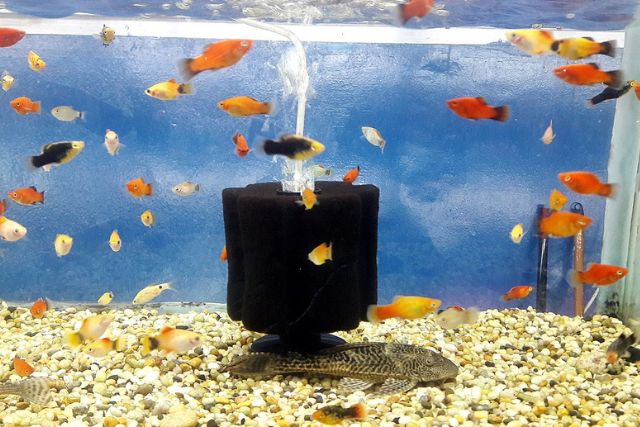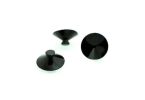Table of Contents
Maintaining a clean and healthy aquarium is crucial for the well-being of your fish. One of the most important aspects of aquarium maintenance is changing the filter regularly. But how often should you change your aquarium filter?
In this article, we’ll explore the factors that affect how often you should change your filter, including the type of filter, the size of your aquarium, and the number of fish you have.
We’ll also discuss the signs that indicate it’s time to change your filter and provide tips on how to change it properly. Whether you’re a seasoned aquarist or a beginner, read on to discover everything you need to know about how often to change your aquarium filter.
Why Change Aquarium Filter
Aquarium filters are essential in maintaining a healthy aquatic environment for fish and other aquatic creatures. Over time, filters can become clogged with debris, reducing their effectiveness and potentially causing harm to aquatic life.
In this section, we will explore why it is important to change aquarium filters, when to change them, and the signs that indicate a filter needs changing.
When to Change Aquarium Filter
The frequency with which an aquarium filter should be changed depends on several factors, including the size of the aquarium, the number and type of fish, and the type of filter.
In general, it is recommended to change aquarium filters every 4-6 weeks. However, it is important to monitor the filter and adjust the frequency of changes as needed.
Signs that Indicate Aquarium Filter Needs Changing
There are several signs that indicate an aquarium filter needs changing. These include:
- Reduced water flow: If the water flow from the filter is reduced, it may be a sign that the filter is clogged and needs changing.
- Cloudy water: If the water in the aquarium appears cloudy, it may be a sign that the filter is not working effectively and needs changing.
- Foul odor: If the water in the aquarium has a foul odor, it may be a sign that the filter is not working effectively and needs changing.
- Algae growth: If there is an excessive growth of algae in the aquarium, it may be a sign that the filter is not working effectively and needs changing.
In conclusion, changing aquarium filters is an important part of maintaining a healthy aquatic environment.
It is recommended to change filters every 4-6 weeks, but it is important to monitor the filter and adjust the frequency of changes as needed.
Signs that indicate a filter needs changing include reduced water flow, cloudy water, foul odor, and excessive algae growth. By monitoring the filter and changing it when necessary, aquatic life can thrive in a healthy and safe environment.
How Often to Change Aquarium Filter
Factors that Affect Frequency of Filter Changes
The frequency of changing an aquarium filter depends on various factors such as the size of the aquarium, the number of fish, the type of filter, and the type of fish.
A larger aquarium with more fish will require more frequent filter changes than a smaller aquarium with fewer fish.
The type of filter also plays a role in the frequency of filter changes. For example, a mechanical filter will need to be changed more frequently than a biological filter.
The type of fish in the aquarium is another factor to consider. Certain types of fish produce more waste than others, which can lead to clogged filters and require more frequent changes.
Additionally, overfeeding fish can lead to an increase in waste production, which can also affect the frequency of filter changes.
General Guidelines for Changing Aquarium Filter
While there are many factors to consider, there are some general guidelines for changing an aquarium filter. It is recommended to change the filter every two to four weeks, depending on the size of the aquarium and the number of fish. However, it is important to monitor the filter regularly and change it as needed.
Here are some signs that indicate it is time to change the filter:
- Reduced water flow: If the water flow from the filter has decreased significantly, it may be time to change the filter.
- Dirty filter media: If the filter media looks dirty or clogged, it is time to change the filter.
- Foul odor: If the aquarium water has a foul odor, it may be time to change the filter.
It is important to note that changing the filter too frequently can also have negative effects. Changing the filter too often can remove beneficial bacteria that help maintain a healthy aquarium environment.
Therefore, it is important to find a balance and monitor the filter regularly to ensure it is changed at the appropriate time.
In summary, the frequency of changing an aquarium filter depends on various factors, including the size of the aquarium, the number of fish, the type of filter, and the type of fish.
It is generally recommended to change the filter every two to four weeks, but it is important to monitor the filter regularly and change it as needed.
Types of Aquarium Filters
Aquarium filters are essential components that help to maintain the water quality in the tank by removing waste, debris, and other harmful substances. There are three main types of aquarium filters: mechanical filters, biological filters, and chemical filters.
Mechanical Filters
Mechanical filters remove debris and waste from the water by physically trapping them. They are typically made of foam, sponge, or floss, and are placed in the filter compartment or in a separate filter housing. Mechanical filters are the most common type of filter used in aquariums.
Mechanical filters should be cleaned regularly to prevent clogging and maintain their effectiveness. Depending on the size of the tank and the number of fish, mechanical filters may need to be cleaned every week or every other week.
Biological Filters
Biological filters use beneficial bacteria to break down waste and convert harmful substances into less toxic compounds.
These filters typically consist of a media that provides a surface area for the bacteria to grow on, such as ceramic rings, bio-balls, or sponge.
Biological filters take longer to establish than mechanical filters, as it takes time for the beneficial bacteria to grow. However, once established, they are highly effective at maintaining water quality.
Biological filters should not be cleaned too often, as this can disrupt the bacterial colonies. Instead, they should be rinsed with aquarium water during water changes.
Chemical Filters
Chemical filters use adsorption or absorption to remove specific substances from the water. They are typically made of activated carbon, zeolite, or ion exchange resin. Chemical filters are useful for removing odors, discoloration, and other impurities from the water.
Chemical filters should be replaced regularly, as they become saturated with the substances they are designed to remove.
The frequency of replacement depends on the type of filter and the size of the tank. It is important to follow the manufacturer’s recommendations for replacement intervals.
In summary, aquarium filters are essential for maintaining water quality in the tank. Mechanical filters remove debris and waste, biological filters use beneficial bacteria to break down waste, and chemical filters remove specific substances from the water.
Each type of filter has its own maintenance requirements, and it is important to follow the manufacturer’s recommendations for cleaning and replacement.
Conclusion
In conclusion, the frequency of changing aquarium filter depends on various factors such as the type of filter, the size of the aquarium, the number of fish, and the feeding schedule.
As a general rule, it is recommended to change the filter media every 2-4 weeks, depending on the condition of the filter.
However, it is important to keep in mind that the filter should not be changed all at once, as this can lead to a sudden loss of beneficial bacteria that help to maintain a healthy aquarium environment.
Instead, it is recommended to change only a portion of the filter media at a time, gradually replacing it over several weeks.
Regular maintenance of the aquarium filter is crucial for the health of the fish and the overall well-being of the aquarium.
Neglecting to change the filter media can lead to a buildup of harmful toxins and bacteria, which can cause a range of health problems for the fish.
In addition to changing the filter media, it is also important to clean the filter regularly to remove any debris or waste that may have accumulated.
This can be done by rinsing the filter media in a bucket of aquarium water, rather than tap water, which can contain chlorine and other harmful chemicals.
Overall, maintaining a clean and healthy aquarium filter is essential for the longevity and well-being of the fish. By following these guidelines and regularly changing and cleaning the filter, owners can ensure that their aquarium remains a safe and healthy environment for their aquatic pets.







